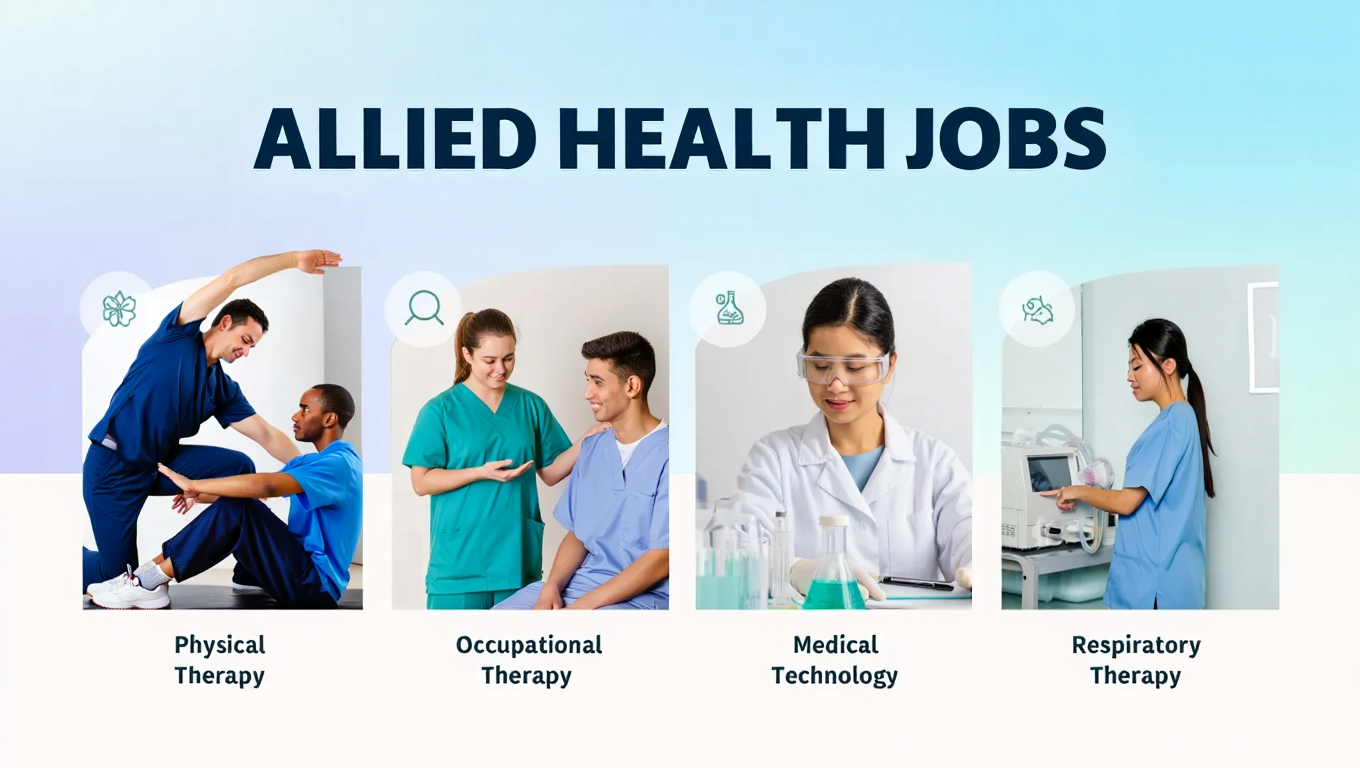
What is a job in allied health?
If you’ve ever asked, “What is a job in allied health?” then you’re in the right place. With a rapidly aging population, expanding healthcare services, and increasing demand for specialised care, allied health careers are in the spotlight.
This article explores what the term allied health really means in the medical field, the vast job opportunities tied to an allied health degree, how to pick the right career path for you, which roles are most in demand, and how you can maximise your degree from day one.
With over 25 years of experience writing about healthcare careers and education, I’ll guide you through this landscape clearly, concisely and with strong professional insight.
What is a job in allied health?
A job in allied health is any healthcare role that supports the diagnosis, treatment, and care of patients, but does not require you to be a doctor or a nurse. Allied health professionals work alongside physicians, nurses, and other medical staff to make sure patients receive complete, high-quality healthcare.
Simple Definition:
Allied health jobs are healthcare careers that help patients through therapy, testing, medical support, rehabilitation, or healthcare administration.
Examples of Allied Health Jobs Include:
-
Medical Assistant
-
Radiology / Imaging Technician
-
Respiratory Therapist
-
Physical Therapist Assistant
-
Dental Hygienist
-
Pharmacy Technician
-
Speech-Language Pathologist
-
Medical Coder & Biller
-
Occupational Therapy Assistant
What Does Allied Health Mean in the Medical Field?
Definition and Scope
In simplest terms, allied health refers to a broad grouping of health-care professionals who are not physicians, nurses, or dentists, yet who provide diagnostic, technical, therapeutic, and direct patient care services in support of the larger medical team.
For example, the Australian Government describes allied health professionals as those trained in university qualifications, working with evidence-based practices to treat various conditions. Another definition emphasises that allied health includes health professions that “assist, facilitate, or complement the work of physicians and other specialists.
Why the Term Allied?
The word “allied” in this context means in alliance with or working alongside traditional medical professions. The allied health workforce complements the roles of doctors and nurses by providing specialised services that allow the healthcare system to operate more efficiently and comprehensively.
In many cases, they enable diagnostic testing, rehabilitation, technical interpretation, and patient-education roles that physicians and nurses may not have time or specialisation to deliver.
How Allied Health Differs from Medicine, Nursing, Dentistry
- Physicians (doctors) diagnose and treat diseases; allied health specialists often assist, provide procedures, or carry out rehabilitation.
- Nurses often deliver bedside and ongoing care; allied health professionals might provide diagnostics (e.g., imaging technologists), therapy (e.g., physio), or technical services (e.g., lab technicians).
- Allied health professions typically require distinct educational pathways, bachelor’s, master’s, certifications, and may not always be regulated in the same way, but they are increasingly professionalised.
What Jobs Can You Get With an Allied Health Degree?
Broad Categories of Allied Health Careers
Allied health covers a range of job families, including:
- Diagnostics & Laboratory: e.g., medical laboratory scientist, radiologic technologist
- Rehabilitation & Therapy: e.g., physiotherapist, occupational therapist, speech-language pathologist
- Technical & Technologist Roles: e.g., ultrasound sonographer, cardiovascular technologist
- Health Informatics & Administration: e.g., health information technician, clinical data manager
- Community & Preventive Health: e.g., exercise physiologist, nutritionist/dietitian, public health allied roles
Examples of Specific Roles
Here are some concrete jobs you can pursue with an allied health background:
- Diagnostic Medical Sonographer (Ultrasound)
- Physical Therapist (Physiotherapist)
- Occupational Therapist
- Speech-Language Pathologist
- Respiratory Therapist
- Medical Laboratory Scientist
- Radiologic Technologist
- Health Information Technician / Medical Records Coder
- Exercise Physiologist / Kinesiologist
- Nutritionist / Dietitian
These position definitions are supported by allied health sector overviews showing the breadth of roles.
Entry-Level vs Advanced Allied Health Jobs
- Entry-level roles (with associate degree, diploma, certificate) might include medical assistants, health information technicians, and technician roles in labs.
- Bachelor’s and above roles: physiotherapist, occupational therapist, clinical lab scientist, speech pathologist.
- Advanced specialisations (master’s, doctoral) lead to leadership, clinical specialisation, research, or teaching roles.
When you ask What jobs can I get with an allied health degree?, you should consider your qualification level, the region’s regulatory requirements, and your preferred setting (hospital, clinic, community, private practice).
What Allied Health Career Is Right for Me?

Choosing the right allied health career involves several considerations. Here’s how to approach it:
Assessing Your Interests and Strengths
- Do you like hands-on therapy and working closely with patients (e.g., physio, OT)?
- Are you drawn to diagnostics, labs, imaging equipment, or behind-the-scenes work (e.g., lab scientist, sonographer)?
- Do you prefer larger-team settings (hospital) or smaller private-practice/community settings?
- What are your strongest skills—communication, manual dexterity, technical aptitude, problem-solving, interpersonal engagement?
- Consider your personality: Do you thrive in fast-paced acute settings or steady-paced outpatient/community care?
Education & Qualification Pathways
- Find out the minimum qualification in your country/region for the role you want. Some allied health roles require bachelor’s degrees, while others allow diplomas or associates.
- Accreditation matters: Many allied health professions require that your education is accredited, and you meet entry-level competency standards.
- Licensing / Registration: Some roles may need licensure, certification exams, or professional membership.
- Consider the time and cost of training—some roles require more years or advanced degrees (e.g., physiotherapist) while others can start quicker.
Work Environment and Lifestyle Considerations
- Setting: hospital, outpatient clinic, private practice, community health, home care.
- Hours & shifts: some roles may include nights, weekends, on-call; therapy roles may have more regular hours.
- Physical demands: therapy roles (e.g., physio) often require strength, mobility; lab/technical roles may involve standing, analyzing samples, less direct patient contact.
- Geographic factors: Demand varies by region—rural/remote areas often have higher need (and sometimes incentives).
- Growth potential: Some professions offer rapid advancement or specialisation; others are steady but limited in upward mobility.
By matching your personal preferences, strengths, and practical constraints (time, cost, location), you can narrow down which allied health career is right for you. You can visit bluebixhealtha
What Allied Health Careers Are in Demand?
Growth Trends & Labour Market Outlook
The allied health field is experiencing significant growth. For example:
- The Australian health department reports that fields like physiotherapy, occupational therapy, and optometry are growing strongly (4–7% annually) over recent years. Health, Disability & Ageing Dept.
- In the U.S., allied health professions are expected to grow much faster than average (e.g., respiratory therapists, speech-language pathologists) according to a 2025 review. ghrhealthcare.com
- One document noted that allied health professionals comprise nearly 60 % of the health workforce in some countries, highlighting scale and demand. fha.org
High-Demand Roles to Watch
Some of the roles showing especially strong demand:
- Physical Therapists / Physiotherapists
- Occupational Therapists
- Speech-language Pathologists
- Respiratory Therapists
- Medical Laboratory Scientists / Technologists
- Health Information/Medical Records Technicians
- Diagnostic Medical Sonographers
These are roles that combine growth, essential services, and often shortages of qualified professionals.
Geographic and Setting-Based Demand (Hospitals vs Community)
- Community-based care and outpatient settings are expanding, meaning roles outside traditional hospital walls are growing. Wikipedia+1
- Rural and underserved areas often have a higher demand for allied health professionals, sometimes with incentives or special programmes.
- As healthcare shifts toward preventive care, chronic disease management, and rehabilitation (rather than just acute care), allied health roles that centre on therapy, rehabilitation, and long-term support become more important.
What Are the Best Allied Health Careers?

Criteria: Salary, Growth, Work Satisfaction
When defining “best”, I look at several criteria:
- Strong job growth outlook
- Competitive salary/compensation
- High job satisfaction (patient impact, autonomy, environment)
- Robust educational pathway and room for advancement
- Versatility (ability to work in many settings)
Top Choices Based on Those Criteria
Based on these criteria and current industry data, some of the top allied health careers include:
- Physiotherapist / Physical Therapist — strong demand, good salaries, impactful work.
- Occupational Therapist — similar benefits, working on meaningful independence for clients.
- Speech-Language Pathologist — growing demand, especially in schools, rehab, and pediatric contexts.
- Diagnostic Medical Sonographer — technical role with strong demand and good pay.
- Medical Laboratory Scientist / Technologist — behind-the-scenes but essential and growing.
- Health Information Manager / Health Informatics Specialist — as healthcare digitises, demand for allied roles here is rising.
How what are allied health careersBest Varies by Your Goals
What’s considered the best for one person may not necessarily be the right fit for another. If you prioritise work-life balance and predictable hours, a therapy role in an outpatient setting might be better than hospital emergency support. If you prefer tech/analysis over direct therapy, lab, or information roles might suit you more. So weigh your personal priorities (flexibility, location, salary, impact) when selecting.
What Can I Do with an Allied Health Degree?
Career Paths with a Bachelor’s in Allied Health
A bachelor’s degree opens many doors:
- You can qualify for many mid-level allied health roles (depending on country/region).
- With a bachelor’s you might also qualify for graduate-entry into specialised fields (e.g., some physiotherapy programmes, advanced therapy roles).
- The degree gives you credibility and foundational knowledge (biology, anatomy, patient care, ethics) that is valued across roles.
- Example: With a bachelor’s in allied health you might become a health information technician, a lab technologist, or move into therapy support roles while you advance your credentials.
Further Education & Specialisation Options
- You could proceed to specialised roles requiring master’s or certification (e.g., speech-language pathology, advanced therapy).
- You could also branch into management, research, education allied health leadership roles, or combine your allied health expertise with business/administration.
- Some professionals use their allied health bachelor’s as a stepping-stone into medical/graduate school, depending on the region and personal goals.
Leveraging Your Allied Health Degree Beyond the Clinic
- Administration: Allied health professionals often move into roles in healthcare management, policy, or business operations.
- Private practice: After experience, you may open or partner in private clinics or therapy practices.
- Community & public health: Your allied health background can serve roles in preventive health, wellness coordination, disability services, and educational outreach.
- Research & technology: The growth of health technology and data means allied health backgrounds can pivot into tech-enabled health services, health informatics, AI or telehealth roles.
In short, the allied health degree gives you both a strong foundation in clinical patient-care roles and flexibility to branch into broader health-service careers.
FAQs
Q1: What is considered an allied health professional?
A1: Generally, an allied health professional is someone who provides health services that assist, facilitate, or complement the work of physicians and nurses.
Q2: Is allied health a good career choice?
A2: Yes — allied health offers stable demand, accessibility to training (in many cases), and the opportunity to make a meaningful difference in people’s lives.
Q3: What jobs can you get with an allied health degree?
A3: You can get roles such as physiotherapist, occupational therapist, speech-language pathologist, diagnostic medical sonographer, medical laboratory scientist, health information technician, exercise physiologist, etc..
Q4: What allied health careers are in demand?
A4: Careers in therapy (physio/OT), diagnostics (sonography), rehabilitation, health information/informatics, and community-based allied health are among those with strong demand.
Q5: What can you do with a bachelor’s in allied health?
A5: With a bachelor’s, you can enter many allied health roles, or use it as a springboard into further specialised study. You can also move into allied health management, research or community health roles.
Q6: How do I decide which allied health career is right for me?
A6: Consider your interests (hands-on vs diagnostics vs tech), strengths (communication, manual skills, analysis), work-environment preference (hospital vs private clinic vs community), and the education/time you’re willing to invest.
Conclusion
The question: What is a job in allied health? encapsulates a vast, dynamic and expanding field of career possibilities. Allied health professionals play a vital role in modern healthcare, working alongside physicians and nurses, providing specialised services from diagnostics and rehabilitation to technical support and preventive care.
With an allied health degree, you’re not just choosing a job—you’re choosing a meaningful path where you can make a difference in patients lives and build a stable, growing career. By understanding what allied means in the medical field, exploring the wide array of jobs you can get, identifying which career path aligns best with you, and choosing roles in demand, you’ll position yourself for success.
For further reading on allied health education and careers, you might explore “What is allied health?” from GHR Healthcare.





